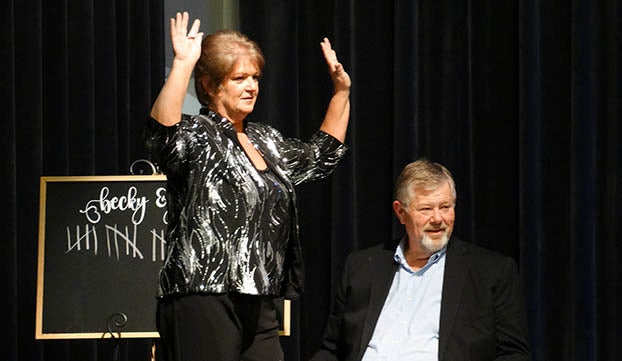Historically Speaking: Shifting of a Legacy?
Published 12:39 am Monday, January 17, 2022
|
Getting your Trinity Audio player ready...
|
With Martin Luther King Day approaching, I have thought a lot about the man who, more than anyone else, historically represents the Civil Rights movement and social justice. At the same time, I have noticed something strange. Is it possible that the keepers of King’s legacy is shifting right? I am not talking about the far right but the right of today’s progressive movement and somewhere in the realm of moderate Democrats and Republicans. I’ll explain what I mean.
King introduced himself to the world when he took over leadership of the Montgomery Bus Boycott in 1955. His charisma, talent, and message of non-violent protest quickly made him a household name and, depending on your viewpoint, became either the most famous or infamous man in the Civil Rights movement. The left claimed him as their champion as he fought to change the status quo and demanded equal rights. The right feared him and saw him as dangerous when he said things like, “Freedom is never voluntarily given by the oppressor; it must be demanded by the oppressed.”
To the right, especially in the South, King wanted to fight against 400 years of racial superiority. He wanted to change the only way of life they knew. King would feel the brunt of their fear as it was personified in hatred. He, his family, and friends dealt with threats, violence, prison, and even death to stand for what they believed in. Yet King never backed down from what he knew to be right while also never turning away from his belief in non-violence, or as he once said, ““Darkness cannot drive out darkness; only light can do that. Hate cannot drive out hate; only love can do that.”
It is said that time heals all wounds, and that seems to be the case with the legacy of King. Moving into the 1970s and 1980s there was racial progress. Race relations were not perfect, just like they are not today, but when comparing life to the 1950s our nation has come a long way. Somewhere along that journey, King went from being a hero on the left to a national hero. By the time I began school in the early 1980s, King was being celebrated by all. I remember listening to his “I Had a Dream Speech” in school when I was a young kid in Virginia. Martin Luther King Day was signed into law in 1983 and done so by a Republican Senate and Ronald Reagan, a champion of the right.
The fact that the right accepted King is not what’s surprising. It’s the idea now that many on the right are seeming to champion his cause. Think about what you see or read in the media. When groups like Black Lives Matter chant their slogan, what is the response from the right? “All lives Matter.” Then somewhere someone will undoubtably quote the most famous of King’s speeches when he said, “I have a dream that my four little children will one day live in a nation where they will not be judged by the color of their skin, but by the content of their character.” I have thought on this a lot recently and tried to pay attention to what different people are saying. From my very unscientific survey, I have found that people on the right outnumber those on the left when citing King in arguments. Granted, most are cherry-picking his quotes, mostly from the “I have a Dream” speech. Probably few have read King’s “Mountaintop” speech where he called for wealth and power redistribution, yet King’s major message may not resonate as much with some on the left as it once did. Especially with the young and progressive wing.
In the 1960s and with the older and moderates today, the goal of the left was a color-blind integrated society. For them, King’s statement of character over skin color plays perfectly. However, for others on the left today, racial goals include categorizing people into races. It’s not that progressives are wrong but are different from what King wanted. King founded the Southern Christian Leadership Conference with the mission statement of “one nation, under God, indivisible, together with the commitment to activate the ‘strength to love’ within the community of humankind.” With organizations like Black Lives Matter, their mission statement says, “to eradicate white supremacy and build local power to intervene in violence inflicted on Black communities by the state and vigilantes. By combating and countering acts of violence, creating space for Black imagination and innovation, and centering Black joy, we are winning immediate improvements in our lives.” These are minor differences but also important ones.
In some ways I wonder if parts of the modern movement are more influenced by another important but lesser-known Civil Rights leader, Stokely Carmichael. Space is too limited to give his entire background, but Carmichael is worth looking up. He was a veteran of Freedom Summer and the Freedom Rides and took over leadership of SNCC. It was Carmichael who began to push the idea of “Black Power,” which called “for Black people in this country to unite, to recognize their heritage, to build a sense of community. It is a call for Black people to define their own goals, to lead their own organizations.” As for King, he did not outwardly criticize “Black Power” and said he understood where Carmichael was coming from, but ultimately opposed it.
I am in no way trying to criticize either side here, right or left. It is simply an observation and historical curiosity. I also see it as incredibly positive how most on the right have embraced Dr. King as a hero. I am grateful that the entire nation can honor what Dr. King did, but, historically speaking, it does seem as if his legacy has gone through a shift from left to center.
Dr. James Finck is an Associate Professor of History at the University of Science and Arts of Oklahoma in Chickasha. He is Chair of the Oklahoma Civil War Symposium. Follow Historically Speaking at www.Historicallyspeaking.blog.






